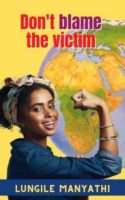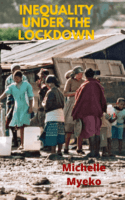The loss of a parent is tragic to any person regardless of their age. For a child, it can be such a traumatic event that it changes the rest of their lives. Karabo Setebe shares how her loss forced her to grow while grieving. #VoicesOfYouth #YChallenge#30StoriesIn30Days WeCan24
Born in Kwazulu Natal in a village called Matatiele, Karabo (16) was the only child to her parents, who provided the best for their little girl. At the age of two, Karabo and her family moved to Cape Town for a better job opportunity for her father.
“My dad was a doctor and we lived in Gugulethu in a two bedroom house. All I remember about that time was my dad working and my mom looking after me at home. When I started to go to crèche my mom returned to work as a teacher.
“My dad would call me his Nini, I remember being a complete daddy’s girl. He would normally take me to his work, especially on days that I didn’t feel like going to crèche. I would sit in the reception area while he helped patients. Seeing him pass by wearing his doctor’s coat made me think – that’s my dad – I was proud of him.”
Karabo and her dad’s relationship became closer as she grew older.
“My mom was usually busy and my dad would take me out, but sometimes mom would join us. I remember one day we went to the park as a family and my dad played with me on the seesaw; one of our favourite things to do… it was a happy moment for all of us.”
For Karabo, her world seemed idyllic until her dad started getting sick when she was only five years old.
“I remember traveling to the hospital to visit him and he looked happy, the way he always was, smiling when he saw me.
“My mom explained that my dad had a heart condition. To keep up his strength he would drink Mageu (a traditional Southern African non-alcoholic drink made from fermented mealie pap) and always eat healthily. But nothing seemed to help and he would get tired quickly.
“One night, I remember lying next to my mom and waking up to the sound of her crying. When I asked her what was wrong she said my dad had passed away. It was overwhelming to hear, but I completely understood what she meant. I didn’t cry, I just sat on the bed.
Not long after Karabo’s father passed away, she and her mom travelled to Kwazulu Natal for her father’s burial.
“I remember seeing the hearse and thinking ‘my father is in there’. It really hit me when I saw him lowered into the ground as he was being buried. I realised I would never see him again.”
“I was in Grade R, so when we came back from the burial I went back to school the following week. No one really asked me how I was feeling and my mom and I never spoke about it, so whatever I was feeling was buried with him. I felt like I was expected to just deal with missing my dad by myself. My mother tried to cheer me up by inviting my cousin from Kwazulu Natal to live with us. She said that if I had someone my age with me then I would feel better, but it didn’t help.
“We were living in the same house so everything reminded me of him and having my cousin with me didn’t help because I missed my dad – my best friend. There was no replacement for the emptiness he had left.
“I found two ways to keep close to his memory, the first one was sitting in his car because I could still sense him. The familiar smells in the car reminded me of our trips together. The second way was by playing with my dog (Tsotsi) who my dad and I found together when we were walking on the street.”
A year after her father passed away, Karabo says that the family had to move to Khayelitsha because of financial problems.
“We moved in with my mother’s family, their house was smaller than the Gugulethu house and we were sharing it with my cousin and aunt who also stayed there. Compared to other people we weren’t struggling, but there were extra mouths to feed because my aunty wasn’t working, so my mom’s money had to be stretched further.
“We also had to sell my dad’s car which broke my heart. I was left with my dog so I would sit with her outside, and think about what my father would want me to do.”
When Karabo was 10 her mother’s boyfriend moved into the house, and shortly after that her mother fell pregnant.
“My mother’s boyfriend would drink a lot and didn’t have a job, I found it disrespectful because he wasn’t respecting my father’s memory – my dad would never have behaved like that. I couldn’t understand how my mother could be with someone like him because my father was so different. I didn’t know how to handle him living there so I began to keep to myself.”
Karabo says that she felt different like she didn’t belong.
“My family started calling me the black sheep and lazy. I never understood what they expected of me. My mother’s boyfriend would boss me around but I wouldn’t listen to him. He was always drunk and I thought he didn’t deserve my respect. However, I would listen to my mother and began to do everything at home. I would take care of all household chores when I came back from school. It wasn’t easy to adapt to my new way of life, I began to feel angry about everything and argued with my mother often.”
The relationship with her mother began to deteriorate and soon turned physical.
“One time my mom slapped me because I didn’t want to wash the dishes after I had cooked for everyone. Sometimes I felt like she wanted to show people that she could control me. I tried to speak to her about how difficult it had been after my father’s death, and about all the changes, but she never listened to me and instead ignored me.”
Karabo says that because of the situation at home she decided to focus on her future to take her mind off what was happening.
“I began to think about the meaning of my life and feeling stuck like I couldn’t change my situation. In my lowest moments, I would hug Tsotsi and my dad would always come into my mind to say that I was going to be okay and that I must keep going.
“Instead of focussing on what was going wrong at home I looked at what I could create both at school and home. I can’t explain how I started to change the way I looked at life, but I just did. If I really had to think about it I would say that I now know the things I have the power to change and the things I should just accept.”
Karabo’s new found attitude towards her life has led her to achieve academic success.
“In Grade 8 I was voted RCL (Representative Council for Learners) chairperson and I discovered that I enjoyed public speaking. I would often be invited by teachers to participate in speeches at school that made me more visible and confident. Unfortunately, my new self attracted the wrong attention. A group of girls started picking on me and saying that I must think I am better than anyone else, they would often call me names. I could not understand why this was happening and all attempts I made to resolve it never worked out. The group continued picking on me for years. It made me sad but I refused to allow them to change my new discovered self.
“I am certain that we can’t change other people, they need to change themselves. I will not be able to change my mom’s boyfriend, my mom, or even the bullies at school. The only person I have the power to do something about is myself. I have learnt to distinguish between things I can change and things I need to accept … in this way I can focus my energy on the things that bring me closer to be the person my dad would have been proud of.”
***
Salesian Life Choices is an enterprise working towards human profit. We give youth in the Cape Flats (Cape Town) CHOICES, not charity. We promote dignity, not dependency. Youth is 37% of South Africa’s population, but they are 100% of its future. Salesian invest in youth to make choices that can change themselves, their communities and the world. This is not our tagline … this is our promise. Their mission is to tackle inequality. People are born into the world as assets, it is the way we treat them, that make them a liability. At Salesian Life Choices, they dare to imagine the world as it could be. A world where we see beyond differences and we connect with each other as equals. A world of abundance – for all humans and the planet. For More information on what they do please visit our website: www.lifechoices.co.za



